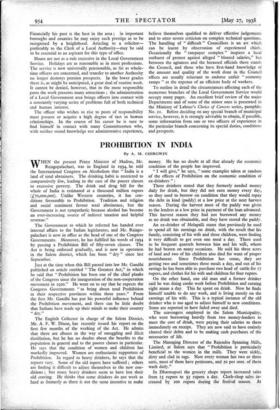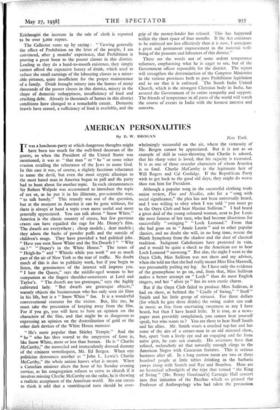PROHIBITION IN INDIA
By A. M. CHIRGWIN
WHEN the present Prime Minister of Madras, Mr. Rajagopalachari, was in England in 1934, he told the International Congress on Alcoholism that " India is a land of total abstainers. The drinking habit is restricted to comparatively few, leading in the case of the poorer classes to excessive poverty. The drink and drug bill for the whole of India is estimated at a thousand million rupees (£7o,000,000). Unlike Western countries, it has con- ditions favourable to Prohibition. Tradition and religion and social sentiment favour total abstinence, but the Government is not sympathetic because alcohol has become an ever-increasing source of indirect taxation and helpful revenue."
The Government to which he referred has handed over internal affairs to the Indian legislatures, and Mr. Rajago- palachari is now in office as the head of one of the Congress Governments. Moreover, he has fulfilled his words of 1934 by passing a Prohibition Bill of fifty-seven clauses. The Act is being enforced gradually, and is now in operation in the Salem district, which has been " dry " since last September.
Just at the time when this Bill passed into law Mr. Gandhi published an article entitled "The Greatest Act," in which he said that "Prohibition has been one of the chief planks of the Congress since the inauguration of the non-cooperation movement in 1920." He went on to say that he expects the Congress Governments "to bring about total Prohibition in their respective provinces within three years." From the first Mr. Gandhi has put his powerful influence behind the Prohibition movement, and there can be little doubt that Indians have made up their minds to make their country The English Collector in charge of the Salem District, Mr. A. F. W. Dixon, has recently issued his report on the first few months, of the working of the Act. He admits that there are abuses in the way of smuggling and illicit distillation, but he has no doubts about, the benefits to the population in general and to the poorer classes in particular. He says that the condition of women and children has markedly improved. Women are enthusiastic supporters of Prohibition. In regard to heavy drinkers, he says that the reports vary. Some of the old topers have suffered ; others are finding it difficult to adjust themselves to the new con- ditions; but many heavy drinkers seem to have lost their old craving. He thinks that some drinkers do not work as hard as formerly as there is not the same incentive to make money. He has no doubt at all that already the economic condition of the people has improved.
" I will give," he says, "some examples taken at random of the effects of Prohibition on the economic condition of ex-drinkers" : Three drinkers stated that they formerly needed money daily for drink, but they did not earn money every day, so they used to borrow on condition that they would repay the debt in kind (paddy) at a low price at the next harvest season. During the harvest most of the paddy was given to the lenders at a low price in payment of the loan advanced. This harvest season they had not borrowed any money as no drink was obtainable, and they have stored the paddy.
An ex-drinker of Melapalli states that previously he used to spend all his earnings on drink, with the result that his family, consisting of his wife and three children, were finding it very difficult to get even one meal a day. There used to be frequent quarrels between him and his wife, whom he had beaten on many occasions. He sold his three acres of land and two of his children also died for want of proper nourishment. Since Prohibition has come, they are getting two and sometimes three meals a day, and out of his savings he has been able to purchase two head of cattle for 17 rupees, and clothes for his wife and children for four rupees.
On the other hand, one old man and a former drinker said he was doing coolie work before Prohibition and earning eight annas a day. This he spent on drink. Now he finds himself unable to do any work, and is living mostly on the earnings of his wife. This is a typical instance of the old drinker who is too aged to adjust himself to new conditions. Some are reported .to have faded away and died.
The scavengers employed in the Salem Municipality, who were borrowing heavily from two money-lenders to meet the cost of drink,, were paying their salaries to them immediately on receipt. They are now said to have entirely cleared their debts and to be making cash purchases of the necessaries of life.
The Managing Director of the Rajendra Spinning Mills, Limited, at Salem says that "Prohibition is particularly beneficial to the women in the mills. They were sickly, dirty and clad in rags. Now every woman has two or three saris, most of them have petticoats, and 50 per cent. of them wash daily."
In Dharmapuri the grocery shops report increased sales from 25 rupees to 35 rupees a day. Cloth-shop sales in- creased by 200 rupees during the festival season. At Krishnagiri the increase in the sale of cloth is reported to be over 3,000 rupees.
The Collector sums up by saying : "Viewing generally the effect of Prohibition on the lives of the people, I am convinced, after 3 months' experience, that Prohibition is proving a great boon to the poorer classes in this district. Leading as they do a hand-to-mouth existence, they simply cannot afford the expensive luxury of drink, which used to reduce the small earnings of the labouring classes to a miser- able pittance, quite insufficient for the proper maintenance of a family. Drink brought misery into the homes of many thousands of the poorer classes in this district, misery in the shape of domestic unhappiness, insufficiency of food and crushing debt. Already in thousands of homes in this district conditions have changed to a remarkable extent. Domestic brawls have ceased, a sufficiency of food is available, and the grip of the money-lender has relaxed. This has happened within the short space of four months. If the Act continues to be enforced not less effectively than it is now, I anticipate a great and permanent improvement in the material well- being of the peasants and labourers of this district."
These are the words not of some ardent temperance reformer, emphasising what he is eager to see, but of the Government officer reponsible for the district. The report will strengthen the determination of the Congress Ministries in the various provinces both to pass Prohibition legislation and to see that it is enforced. The South India United Church, which is the strongest Christian body in India, has assured the Government of its entire sympathy and support. The friends of temperance in all parts of the world will watch the course of events in India with the keenest interest and concern.



















































 Previous page
Previous page